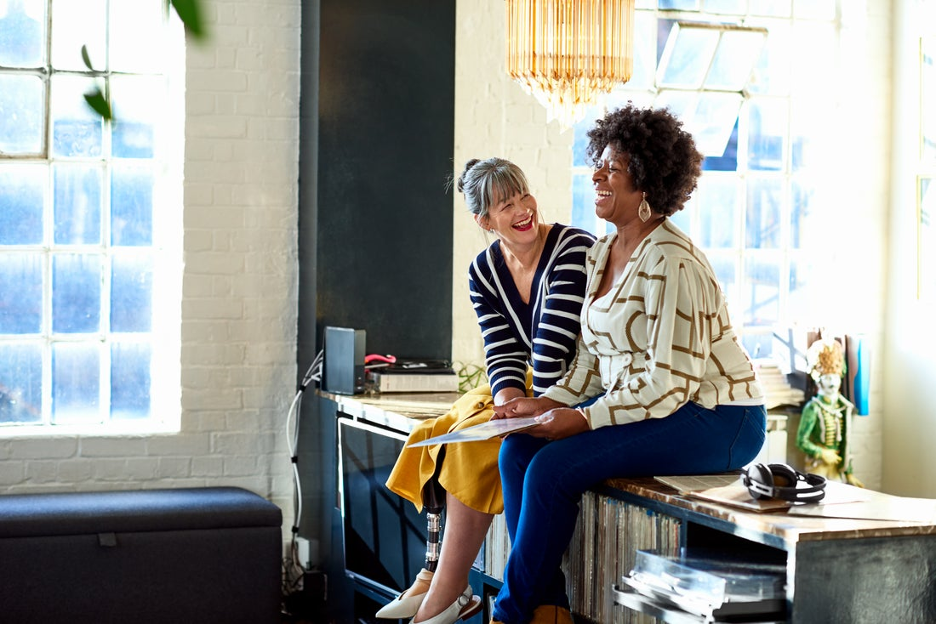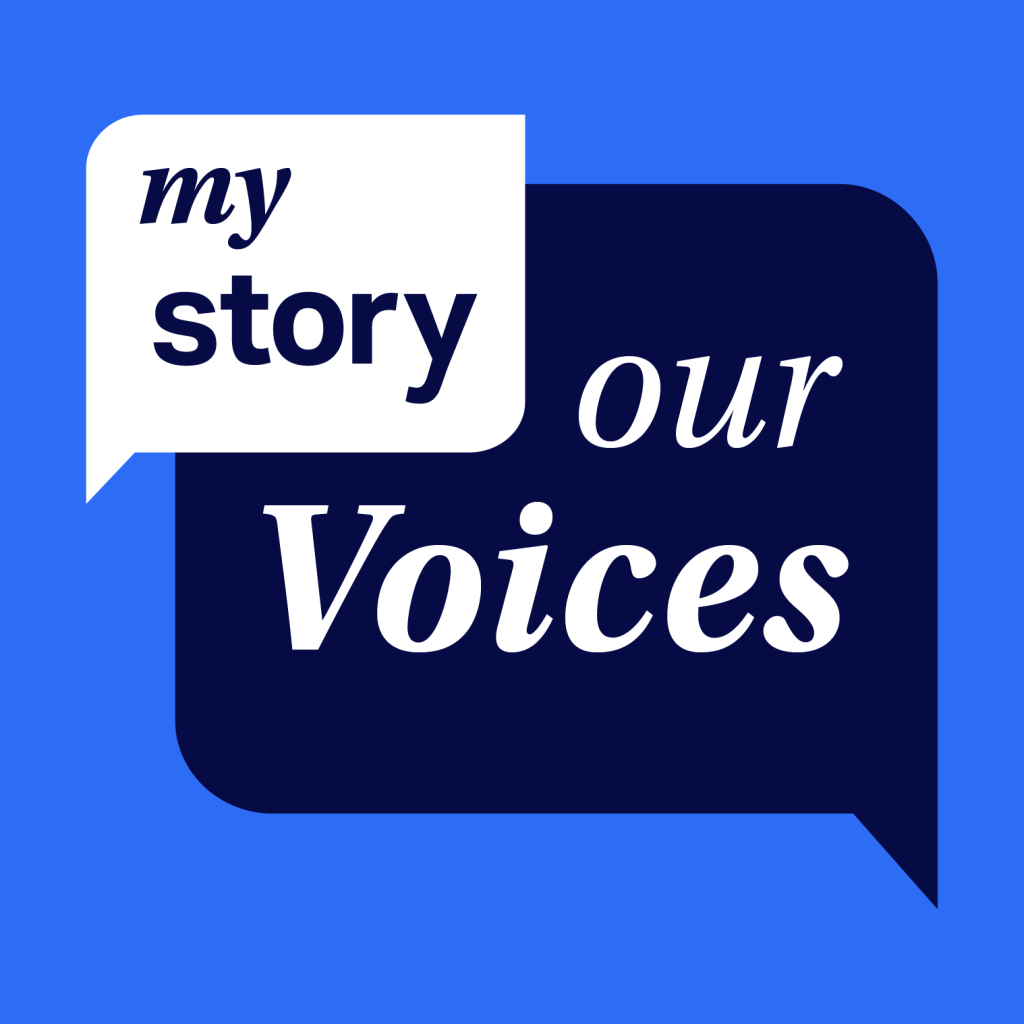Join us as we explore the inspiring journey of Lorena Diaz, a dedicated translator at NielsenIQ who championed the Discovery Internship program for individuals with disabilities. Discover how Lorena’s passion for inclusion and mentorship transformed her team and created opportunities for growth and empowerment. Tune in to hear her heartfelt experiences, the challenges she overcame, and the powerful impact of embracing diversity in the workplace. Get ready to be inspired by Lorena’s story of resilience, learning, and making a difference!
Sit down with hosts Funda Kalemci and James Anderson as they talk with Lorena Diaz about bringing ideas to the table and adapting the way we work to accommodate those with disabilities.

Summary
“Remain humble and don’t assume we know everything. Also don’t assume we are totally unbiased, so just [be] humble and open; just ask the questions.” – Lorena Diaz
In this episode of My Story, Our Voices – an NIQ podcast and part of NielsenIQ’s DEI Learning series -we speak with our associate, Lorena Diaz, based in Brussels, Belgium – a dedicated translator at NielsenIQ who championed the Discovery Internship program for individuals with disabilities.
In late 2021, Lorena and her team began discussing the possibility of integrating individuals with disabilities into their local staff. Inspired by positive experiences in other regions, they reached out to local NGOs for guidance and discovered the Discovery Internship program in Belgium. This program allows individuals with disabilities to join a company for 20 days to familiarize themselves with the working environment and gain confidence in their skills. With the support of local HR and higher management, Lorena’s team launched the recruitment process and welcomed two interns in May/June of the following year.
The experiences of the two interns were vastly different. The first intern struggled to integrate and left the program early, which was disappointing for Lorena. However, the second intern thrived, fitting well with the company culture and showing great interest in the tasks assigned. This intern even received a job offer from NielsenIQ Brand Bank and continued working with the company for several months. Lorena’s involvement in this initiative taught her valuable lessons about working with individuals with disabilities, including the importance of asking questions and avoiding assumptions.
One of the interns had a stammer, and Lorena initially hesitated to ask how she should handle conversations. She learned that asking politely and openly about preferences can help smooth relationships and break the taboo surrounding disabilities. This experience also helped Lorena grow as a coach and mentor, providing her with practical insights into teaching and managing challenging situations.
Lorena’s journey with the Discovery Internship program was driven by her involvement in the Inclusion Impact Team, which she joined out of curiosity and interest. Over time, she gained confidence and felt empowered to bring forward ideas and initiatives. The team’s enthusiasm and support played a crucial role in the success of the internship program.
The impact of the internship extended beyond Lorena to the entire local team. The interns’ presence helped colleagues realize that disabilities are not barriers but opportunities to connect with wonderful individuals. This eye-opening experience energized and engaged the team, fostering a more inclusive workplace.
Lorena’s story highlights the importance of bringing forward ideas, even if they seem challenging or unrealistic at first. Her experience with the Discovery Internship program demonstrates that any idea can lead to positive outcomes with the right support and enthusiasm. She encourages others to remain humble, open, and curious, asking questions and avoiding assumptions to create a respectful and inclusive environment.
The journey was not without its challenges. The first intern’s early departure taught Lorena to avoid taking setbacks personally and to maintain a professional distance. She learned that not all experiences are successful, but each one provides valuable lessons for future initiatives.
Lorena’s experience with the internship program has broader implications for creating inclusive approaches to recruitment and intern programs. While the program was tailored to individuals with disabilities, its principles of support, integration, and empowerment can be applied to other demographics and affinities. The key is to identify tasks that align with the interns’ skills and interests and to provide a supportive environment that fosters growth and confidence.
Lorena Diaz’s journey with the Discovery Internship program is a testament to the power of inclusion and the positive impact it can have on individuals and teams. Her story encourages others to bring forward their ideas, embrace challenges, and create a more inclusive and empowering workplace.
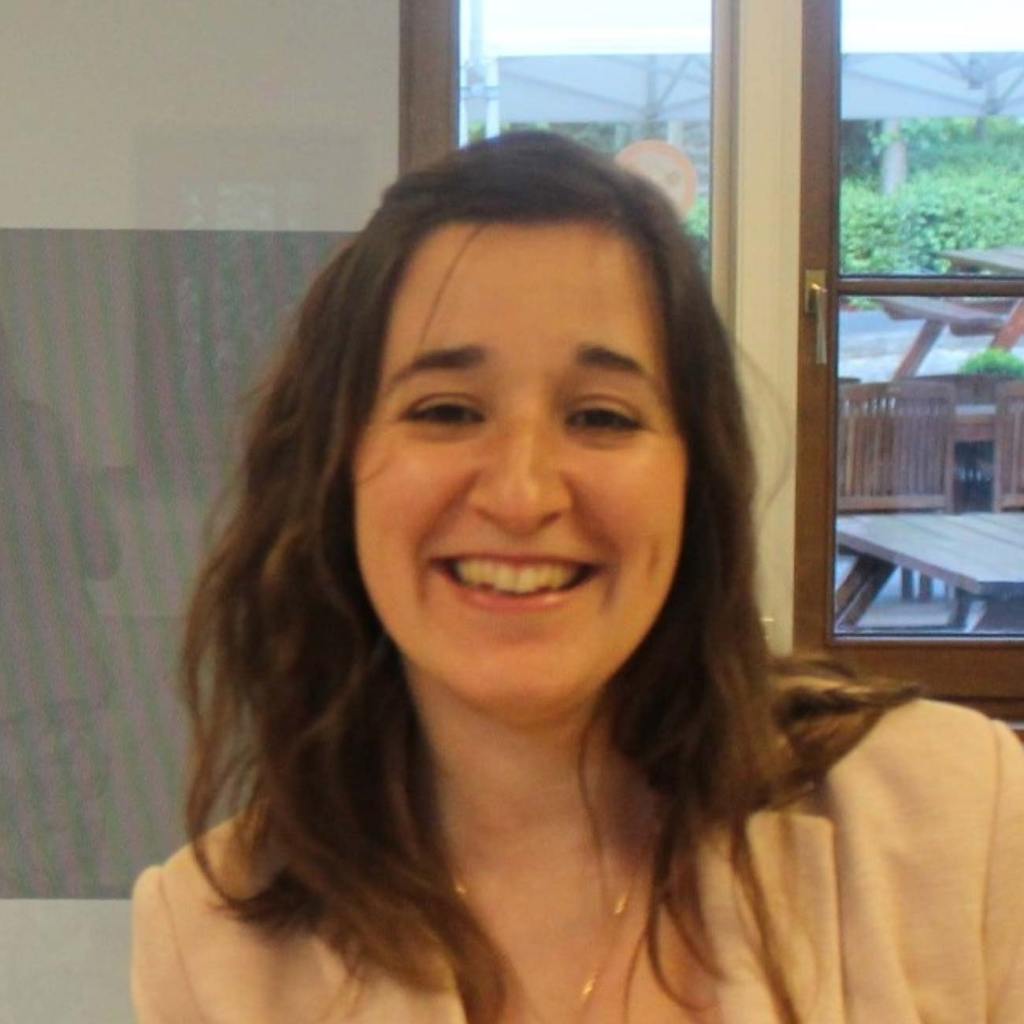
Lorena Diaz
Senior Regional Translator Coordinator – Operations – BASES
Lorena joined BASES almost 17 years ago. She is the Inclusion Impact Chair for Belgium, and an N-GEN ERG Europe lead. Helping others and contributing to a better world is what energizes her!
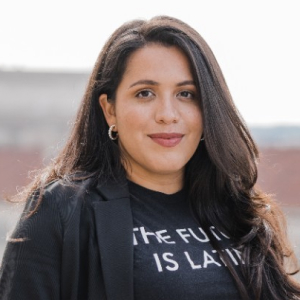
Angel Diaz Ospina – Washington, D.C., USA
Sr. Manager, DEI Talent Programs
Angel has been at NIQ for 4.5 years. She enjoys social dancing, hiking, traveling, and DIY projects. She also has an interest in civic engagement volunteer work, immigration advocacy, diversity & inclusion, and mentorship.
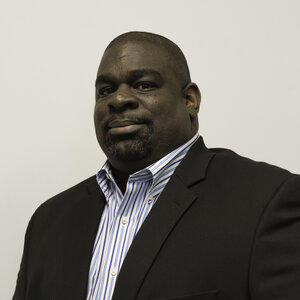
Terrance Bacchus – Cincinnati, Ohio, USA
Vice President, New Customer Success ELP
Terrance has been with NielsenIQ for 2 years after 20+ years at General Mills. His interests include giving back to the community, inspiring and coaching young people to seek financial empowerment by being resilient and making smart choices.
Transcript
The views and opinions expressed in this podcast belong to the individuals who shared them and do not necessarily represent NielsenIQ. Note that this podcast discusses sensitive topics that may be triggering for some. For more information specific to this episode, see the episode description.
Laura Batien: Hi everyone and welcome to My Blank Story. My name is Laura Batien and if this is your first time tuning in then let me tell you what this podcast is all about. In a nutshell, it’s about stories, your stories. We think stories are important because when we tell them we open the door and allow others to see the experiences that shaped us, that challenged us and helped us grow. By doing this, we can create a culture where open dialogue is encouraged, and we can have a space to discuss important topics in a transparent and courageous manner. So, minimize that e-mail tab, mute your chat and take a little break to listen to an NIQ story.
James Anderson: Hello everyone and welcome back to another episode of My Blank Story. The podcast here at NIQ, sponsored by Diversity, Equity, and Inclusion. My name is James Anderson. I’m one of the hosts for today’s episode. My pronouns are he, him and his. I currently work as a senior analyst here in the Toronto Office in Canada. And I’m joined today by my co-host Funda. How are you today? Funda.
Funda Kalemci: Hi James. I’m doing great. Hope you’re well too.
James Anderson: Yes, really well. Looking forward to meeting our guest today.
Funda Kalemci: Same here. So, before that, hello everyone. This is Funda. I’m the global leader for Diversity, Equity and Inclusion at NIQ. And I am so happy to be here today because our guest today is someone very special to me, near and dear to my heart as well, Lorena Diaz. Lorena is based in Brussels, Belgium. She has been with the company for 16 years. She has been working as our as one of our translators in the global translation team in BASES Ops. She’s also a part of N-Gen, our generational ERG, NielsenIQ Generation co-lead for Europe. And outside of work, she enjoys spending time with her two boys and her family, cooking and baking, reading, listening to music and dancing. And I’ll add one more thing to that. Lorena is special to me, mostly because she is the peer who onboarded me to the company 12 years ago. I shadowed her for months to learn the ropes. Since then, I have, you know, changed jobs, but we have always kept in touch, and I am so happy to introduce Lorena today to share her story with us.
Lorena Diaz: Hi everyone. Thanks for having me today, here is my D&I story I’d like to share. So, late 2021, we started discussing in our Inclusion Impact Team meetings the opportunity to integrate someone with disability towards staff locally. We had heard about some positive experiences in other regions, and we knew that something could be done in our office too. We were excited about the idea, but we had no idea where to start. So, we contacted some local NGO’s supporting people with disabilities to integrate in the work. And they directed us to some official program in place in Belgium. It was called Discovery Internship, and it allowed some persons with disability to join a company for 20 days to become familiar with the working environment and gain confidence in their skills. We ran the project through our local HR and higher management, and they were very excited and supportive. The next challenge was to identify the tasks for our intern. Due to the very limited duration of the internship, only 20 days, it was not possible to have extensive training. And still, we wanted the internship to be meaningful for the intern and useful for the team. We finally identified 2 tasks and we could launch the recruitment process. Around May/June last year we could welcome 2 interns in our office. Both experiences have been very different. The 1st intern didn’t feel integrated despite our efforts, and he left the program before the end. This was very disappointing for me personally due to the effort and dedication that was put in the initiative, but I guess it’s also part of the learning process. For the second intern, it was a totally different story. He felt super integrated. He was a really good fit with our company culture. And he was interested in everything that we showed. And even he got a real job offer from NielsenIQ Brand bank and he could continue working with us for a few additional months. This experience really meant a lot of learning on my side. It helped me get familiar with our interns and disabilities and understand that it’s OK to ask and avoid making assumptions. Like for example, one of her interns had a stammer. And at first, I didn’t dare to ask like “Do you prefer me to finish your sentence or is it OK for me to wait till the end?” It might sound like a very small thing, but it really helps to smooth the relationship and it breaks the taboo of disability. On a personal level, it also helped me grow as a coach and mentor. It was really like the first experience as a people manager for me and it helped me get to know the practical aspects, the teaching process and also to deal with more challenging situations. I’m very thankful that we were able to carry this on thanks to our company D&I program and the local support that we got. But the main reason for me to share this story today is to show everyone that any idea is worth to be brought forward. And even if it may sound a bit unrealistic or challenging at first, i might end up in a really positive experience.
James Anderson: Thank you so much, Lorena, for sharing your story with us. One of the things that you said really resonated with me and that was when you said that ideas are worth bringing forward and in in this context, you know, creating this, this new internship program, I was wondering, taking a step further back what inspired you to consider this as an option for the workplace? What was there, was there a catalyst, something that made you think that you wanted to be a better mentor or a better coach? Or was it just something kind of that you something you noticed and you kind of wanted to create this opportunity for people to join the company who may have a disability?
Lorena Diaz: Yeah. So, it’s an interesting story because I was invited by mistake to a D&I meeting in another region, and I heard the story of something similar happening in another region, and that’s where, like, the idea popped up in my mind. So, I brought that back to my region, to the team, and we just started discussing and it was like just exchanging with the others that we really noticed that there was this need. So, there was no one with a disability in the team and that something could be done and that’s where we all started. But it actually happened randomly, I guess. So, we just bumped into the occasion.
James Anderson: And how long was the actual process then? You know from the moment the that sort of the light bulb went off, how long did it take because then you contacted Discovery Internship in Belgium and how how long did it take as a process to kind of bring these sorts of things together? Because I think this is something that’s very inspiring for other people to kind of know that, you know, to take a light bulb moment through to I guess completion or to fruition.
Lorena Diaz: Yeah, it took a few months, actually, so. And I think the longest part was really to identify what task we could, so, like learning about the project. I mean the possibility was one thing, that was quite easy, but identifying something that we could actually ask the intern to do, it took several tries. We asked several teams and then we came up with our own ideas and that was the most challenging. So yeah, definitely maybe three to six months like to really from the idea to the realization of it. I think it was really impulsed by like the Inclusion Impact Team like in enthusiasm. So, it at first was just an idea as I said. But then with everyone else like finding it a good idea, like let’s go for it. So, I think it was really the energy of the team that really make us continue in that.
Funda Kalemci: I love that, and I want to do some shameless plugging here. Can you talk a little bit about your experience with the Inclusion Impact Team? Not just with this initiative that you ran but overall, like how did it start with, you know, I was I was the catalyst there, recruiting you into the team, but how, how was your experience within the team coming to the point of all this initiative? Basically. Like what took you there?
Lorena Diaz: Yeah, I I think it’s a long story. I mean, long story, it’s a long process, right, because 1st when I joined this team, it was still called Nielsen Cares at the time. And I was just a member. I registered a bit, like out of curiosity interest but without any really big ideas to do big things, right, just participating, sharing ideas. But then with time, it really started to grow and the team growed as well. And so that’s, I think, and actually, it’s not only the team. I think it’s also me who really gained like confidence and like, yeah, feel the way like feeling empowered. Like, OK, I can do this. I can run this idea. So, it’s really also a process here. And I’m really grateful that I was able to be part of that team and grow there.
Funda Kalemci: For our audience, I want to remind that our Inclusion Impact Teams are local to each country, and they run our entire ERG agenda as well as DEI agenda. So, obviously I’m super biased because I love the teams, but I’m so happy to hear Lorena mentioning that feeling empowered, right like that, that is so cool, Lorena. Thank you so much for sharing that. One follow-up to that. Is how did that affect you, what or like how did that affect your work, your day job, or how did you take this experience to your team basically?
Lorena Diaz: So, I think it had, the internship, had an impact on the whole team locally, like to everyone because like, the interns, especially one of them was really integrated. And they really liked enjoying the experience so much and liked talking to everyone. And I think it made not only me, but everyone locally, realize that, OK, so disability is not such a barrier. It’s just a super nice person, I mean in this case as well. So it was, I think it was an eye opener locally for the team. So that’s one thing. And then for me personally, it really gave me a lot of energy and engagement like to be part in this initiative.
James Anderson: One of the things you mentioned in your story was that for the person who was very integrated and actually had a job offer from NIQ, which is amazing. You said that it was. You learned that it was OK to ask questions and sort of deal with those assumptions that you may have had, that we all have really when it comes to these kinds of things. Can you talk a little bit about that process because you mentioned you weren’t sure and then it came about. So, just maybe talk a little bit about that moment about how you overcame, because I feel it’s something that we can all learn from, as you know, going through those kinds of experiences when you do have to or you encourage to sort of approach and deal with an issue like this or deal with something like this.
Lorena Diaz: Yeah, definitely. So, we were actually helped a bit because the intern was supported by an NGO specialist. So, they came on the onboarding the first day and we actually discussed openly the disability. And that’s where we learn that it’s OK to ask questions. Ask them politely, of course, and that’s actually how she helped us realize that it’s OK. It’s not taboo. You can ask and, but then, yeah, just asking and seeing that actually, yeah for the person, it’s the reality, right? It’s not something strange or. So, just ask and see what happens it really helps.
James Anderson: Do you feel more confident now as a coach and as a mentor going, forward with people that you’re working with because of this experience.
Lorena Diaz: Yeah, definitely. It was actually one, I think it was really the first experience for me as a mentor coach, or I mean, yeah, more, more officially let’s say. And I I really learned a lot, yeah definitely still a lot to learn of course. But I think I feel more confident now. Yeah. You know.
Funda Kalemci: I was speaking from your from experience, it definitely wasn’t your first experience, but like you have been an amazing mentor for me over the years. So, thank you for that too. If you had to describe your story in one word, what would that be?
Lorena Diaz: Yeah, I think it would be fulfilling or rewarding because it was really like, I think it was the part that remained with me the most for that year. So, when I had to do my end of year review it was really the thing, I felt more proud about for the whole year.
James Anderson: And I’m just wondering, Lorena, for anyone who might be interested because this is something that, you know, part of a diversity equity, and inclusion process or a step that we sort of want to take forward for anyone who might have ideas about this kind of thing I’m wondering. What were the sort of takeaways that you had from the experience, because we you did mention there was there was another intern who did didn’t end up feeling integrated into the into the process. So, what was there? Was there a debrief was there? Things to sort of take away from that in moving forward and going through this process again.
Lorena Diaz: Yeah, for me that more like this other experience with the intern who didn’t go up to the end was more like to avoid taking it personally, to take the more distance to this. So really to get less personally involved. So that was my learning there. But yeah, apart, because after the experience we of course we discussed with the organization supporting these interns et cetera. And we actually learned something that we didn’t know before that those things happened quite regularly. So, it’s not uncommon. But of course, as a first experience, we didn’t know that so just like to accept that it doesn’t all the time is a successful experience.
Funda Kalemci: So, Lorena, I have one more question. You know this experience you had with the intern program that you created is focusing on one demographic only. If we were to take that out, or if we were to zoom out a little bit and focus on other demographics or other affinities? Would you say you can use this experience to create a more inclusive approach to either an intern program or recruiting program, like how do you feel about this experience helping you with the broader demographic in any given society?
Lorena Diaz: Yeah, that’s a tough one. I guess it could be used right for other affinities as well. But probably not for all. In this case, I guess it’s also like mixed, right? It was so it was targeted to disabled people, but also like rather young, right? It was kind of a first experience in the working place. So that’s also why it worked. But it might. I guess it might not be the same for all other affinities, and it works particularly well in this case for these reasons, but it might not apply to all, to any other.
Funda Kalemci: What would be the aspects that you would, you know, basically lift and check to replicate for others? Would it be the choice? Would it be the organization that you work with?
Lorena Diaz: I think it, yeah, it would be more difficult with other, maybe just, uh, maybe young people, like we could do that, like, but I think we already probably do kind of regular internship with people coming out of the university. But yeah, from yeah, it might work as well, but it might sound a bit artificial for some reason with something else than disability and young people combined.
James Anderson: Just had one final question for you. Now, based on your experience and what you learned from this experience, for our listeners out there, what are one or two top things that you learned you know, particularly since we’re talking about the workplace, when trying to work with or wanting to work with individuals with some kind of disability. Is there something in the approach that you learned or just a couple of the the top two pieces of advice that you would have for anyone who’s in this kind of situation.
Lorena Diaz: Yeah, I think that what we should always remind, and it it goes for everything and everyone, it’s to remain humble and like don’t assume we know everything. Also don’t assume we are totally unbiased, so just humble and open just ask the questions. Be curious and I think in that way it can only go well.
James Anderson: And from a place of respect, of course, asking questions from a place of respect. Well, Lorena, I want to thank you very much for being a guest today on this episode of My Blank Story. The podcast sponsored by Diversity, Equity and Inclusion.
Lorena Diaz: Thank you very much.
Funda Kalemci: Thank you so much, Lorena. Thanks for sharing your story.
Laura Batien: Hey all, it’s Laura again. We hope you enjoyed this episode of my Blank Story. Tune in next time to hear more stories from the NIQ community.
Lorena Diaz: Any idea is worth to be brought forward and even if it may sound a bit unrealistic or challenging at first, it might end up in a really positive experience. Ask the questions, be curious and in that way it can only go well.
Laura Batien: Thanks so much to our producer Laura Batien, and our editor, Angie Arnold-Ott.
